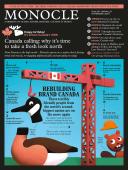
Issue 98
Canada calling: why it’s time to take a fresh look north. From Toronto to the high north – Monocle reports on a nation that’s flexing mind and muscle, re-engaging diplomatically and spreading its wings.
In This Issue
Oops! No content was found.
Looks like we no longer have content for the page you're on. Perhaps try a search?
Return Home

